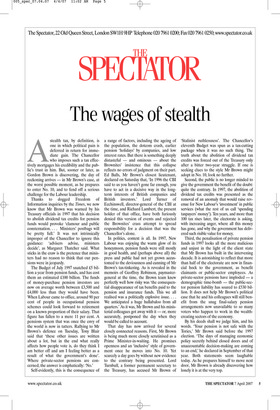The wages of stealth
Astealth tax, by definition, is one in which political pain is deferred in return for immediate gain. The Chancellor who imposes such a tax effectively mortgages his credibility and the public’s trust in him. But, sooner or later, as Gordon Brown is discovering, the day of reckoning arrives — in Mr Brown’s case, at the worst possible moment, as he prepares to enter No. 10, and to fend off a serious challenge for the Labour leadership.
Thanks to dogged Freedom of Information inquiries by the Times, we now know that Mr Brown was warned by his Treasury officials in 1997 that his decision to abolish dividend tax credits for pension funds would provoke ‘clamour and public consternation.... Ministers’ postbags will be pretty full.’ It was not intrinsically improper of the Chancellor to ignore this guidance: ‘advisers advise, ministers decide’, as Margaret Thatcher said. What sticks in the craw is the pretence that ministers had no reason to think that our pensions were in jeopardy.
The Budget of July 1997 snatched £5 billion a year from pension funds, and has cost them an estimated £100 billion. The funds of money-purchase pension investors are now on average worth between £3,500 and £4,000 less than they would have been. When Labour came to office, around 90 per cent of people in occupational pension schemes could look forward to retirement on a known proportion of their salary. That figure has fallen to a mere 11 per cent. A pensions system that was once the envy of the world is now in tatters. Rallying to Mr Brown’s defence on Tuesday, Tony Blair said that ‘these other issues are written about a lot, but in the end what really affects how people vote is, do they think I am better off and am I feeling better as a result of what the government’s done’. Where private-sector pensions are concerned, the answer is emphatically: ‘No.’ Self-evidently, this is the consequence of a range of factors, including the ageing of the population, the dotcom crash, earlier pension ‘holidays’ by companies, and low interest rates. But there is something deeply distasteful — and ominous — about the Brownites’ insistence that this collapse reflects no errors of judgment on their part. Ed Balls, Mr Brown’s closest lieutenant, declared on Saturday that, ‘In 1996 the CBI said to us you haven’t gone far enough, you have to act in a decisive way in the longterm interests of British companies and British investors.’ Lord Turner of Ecchinswell, director-general of the CBI at the time, and Richard Lambert, the present holder of that office, have both furiously denied this version of events and rejected the Brownites’ crass attempt to spread responsibility for a decision that was the Chancellor’s alone.
In politics, context is all. In 1997, New Labour was enjoying the warm glow of its honeymoon, pension funds were still mostly in good health, and (perhaps above all) the press and public had not yet grown accustomed to the deviousness and cunning of Mr Brown’s tax-tinkering. As is revealed in the memoirs of Geoffrey Robinson, paymastergeneral at the time, the Brown team knew perfectly well how risky was ‘the consequential disappearance of tax benefits paid to the pension and insurance funds. This we all realised was a politically explosive issue.... We anticipated a huge hullabaloo from all quarters.’ As it was, Mr Brown and his ministerial colleagues got away with it — or, more accurately, postponed the day when they would be called to account.
That day has now arrived for several closely connected reasons. First, Mr Brown is being much more closely scrutinised as a Prime Minister-in-waiting. He promises openness and an ‘inclusive’ style of government once he moves into No. 10. Yet scarcely a day goes by without new evidence to the contrary being presented. Lord Turnbull, a former permanent secretary to the Treasury, has accused Mr Brown of ‘Stalinist ruthlessness’. The Chancellor’s eleventh Budget was spun as a tax-cutting package when it was no such thing. The truth about the abolition of dividend tax credits was forced out of the Treasury only after a bitter two-year struggle. If one is seeking clues to the style Mr Brown might adopt in No. 10, look no further.
Second, the public is no longer minded to give the government the benefit of the doubt: quite the contrary. In 1997, the abolition of dividend tax credits was presented as the removal of an anomaly that would raise revenue for New Labour’s ‘investment’ in public services (what the rest of us call ‘spending taxpayers’ money’). Ten years, and more than 100 tax rises later, the electorate is asking, with increasing anger, where all this money has gone, and why the government has delivered such risible value for money.
Third, the penalisation of private pension funds in 1997 looks all the more malicious and unjust in the light of the client state that Mr Brown has built in the intervening decade. It is astonishing to reflect that more than half of the electorate are now in financial hock to the government, as benefit claimants or public-sector employees. As private-sector pensions have imploded — a demographic time-bomb — the public-sector pension liability has soared to £530 billion. It does not help Mr Brown’s political case that he and his colleagues will still benefit from the snug final-salary pension arrangements now unavailable to so many voters who happen to work in the wealthcreating sectors of the economy.
By his deeds shall we judge him, and his words. ‘Your pension is not safe with the Tories,’ Mr Brown said before the 1997 election. ‘The days of managing economic policy secretly behind closed doors and of unaccountable decision-making are coming to an end,’ he declared in September of that year. Both statements seem laughable today. As he prepares himself to move next door, Mr Brown is already discovering how lonely it is at the very top.


































































 Previous page
Previous page